Towards an Eco-Friendly UGM: Sustainability in Action
UGM is committed to fighting for sustainability. Sustainability is more than just an environmental commitment—it is a universal principle that transcends disciplines, cultures, and industries. As a guiding framework, sustainability integrates ecological balance, social equity, and economic resilience to ensure that current and future generations can thrive. UGM aims to achieve sustainability in all aspects of university administration policies.
Based on the Board of Trustees Regulation Number 1 Year 2021 concerning the Campus Master Plan (pg. 22. pg. 25), UGM is committed to providing infrastructure that is smart, healthy, comfortable, safe, and sustainable. This includes the development of a green campus with minimal carbon emissions, achieved through programs such as zero-waste initiatives, recycling, reuse, the use of renewable energy, and the promotion of environmentally friendly behaviours.

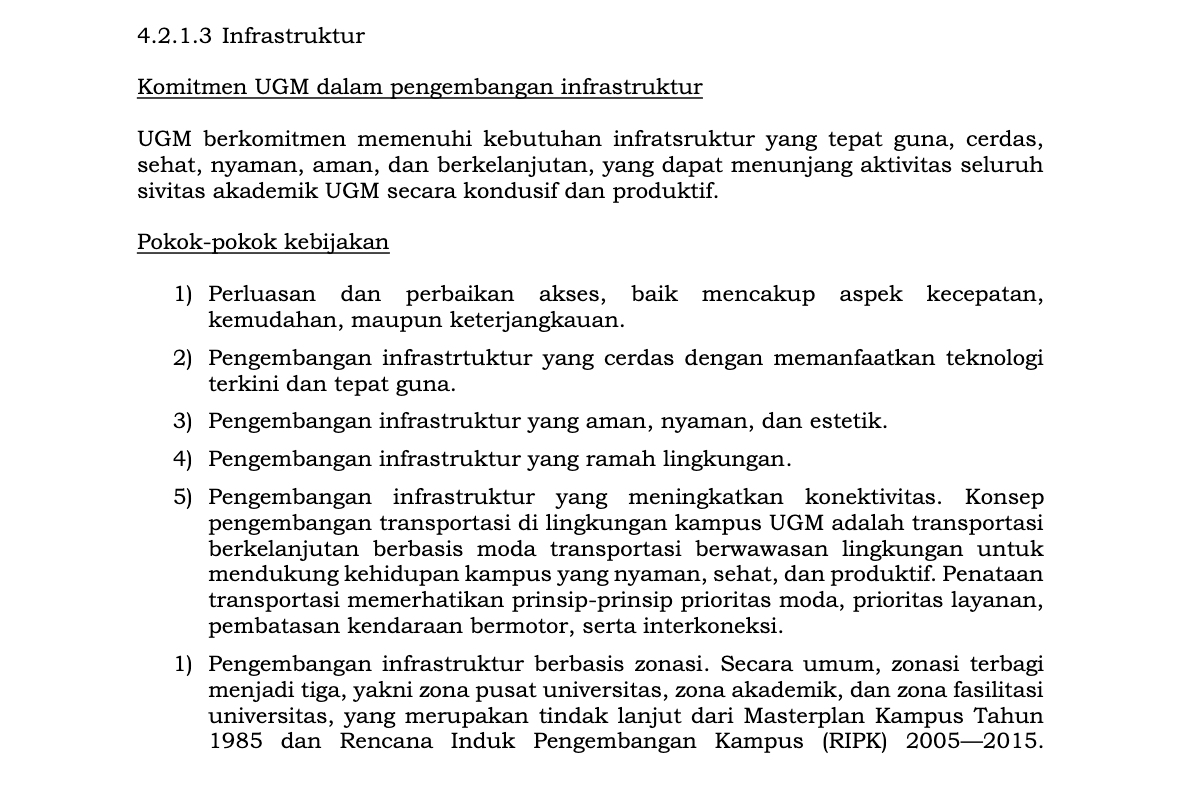
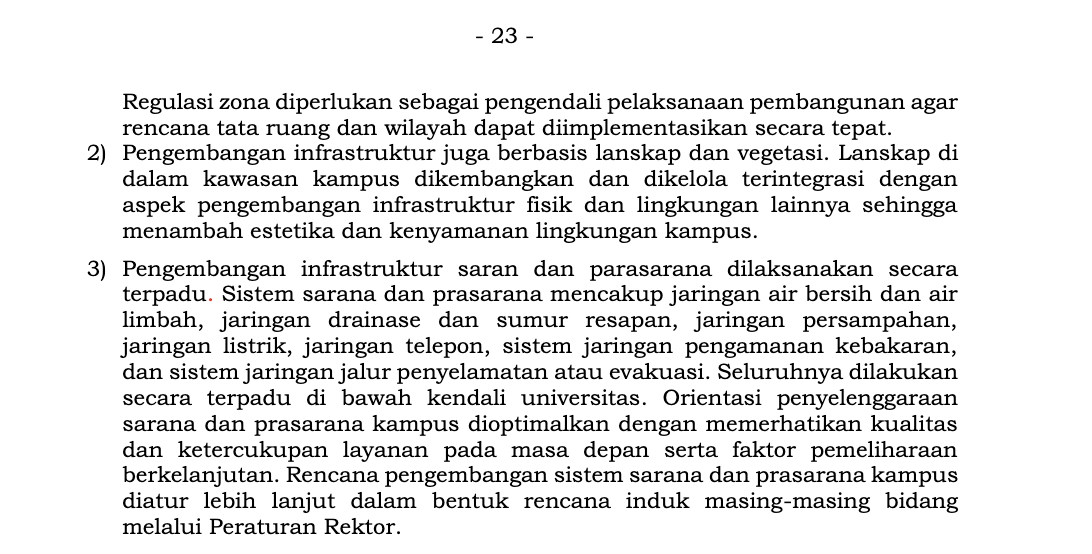
UGM has several circular letters regarding sustainability/climate action, most of which are available on the Circular Letter Regarding the Implementation of SDGs at UGM webpage.
Policies on Environmentally Responsible Behavior
Environmentally responsible behaviour within the campus community is essential to fostering sustainability. Campuses such as UGM can reduce their carbon footprint and conserve natural resources. Campuses consume large amounts of energy, water, and materials. Environmentally conscious behavior—such as energy conservation, waste reduction, and sustainable transportation—helps minimize this depletion of resources.
In order to fortify and encourage environmentally responsible behaviour, UGM has put in place several policies that apply to all students and staff. Without the existence of university policies, sustainability efforts may be inconsistent and short-lived. Regulations create a formal commitment that integrates environmental responsibility into campus operations, research, and student life.
Most recently, UGM has published the Circular Letter Number 16839/UN1.P/HK.02/2024 which outlines the guidelines and commitments to foster environmentally responsible behaviour within the university community, with a specific emphasis on carbon management and the adoption of clean energy solutions. It aims to promote sustainable practices among students, faculty, and staff as part of the institution’s efforts to reduce greenhouse gas emissions, lower its ecological footprint, and contribute to global environmental sustainability.
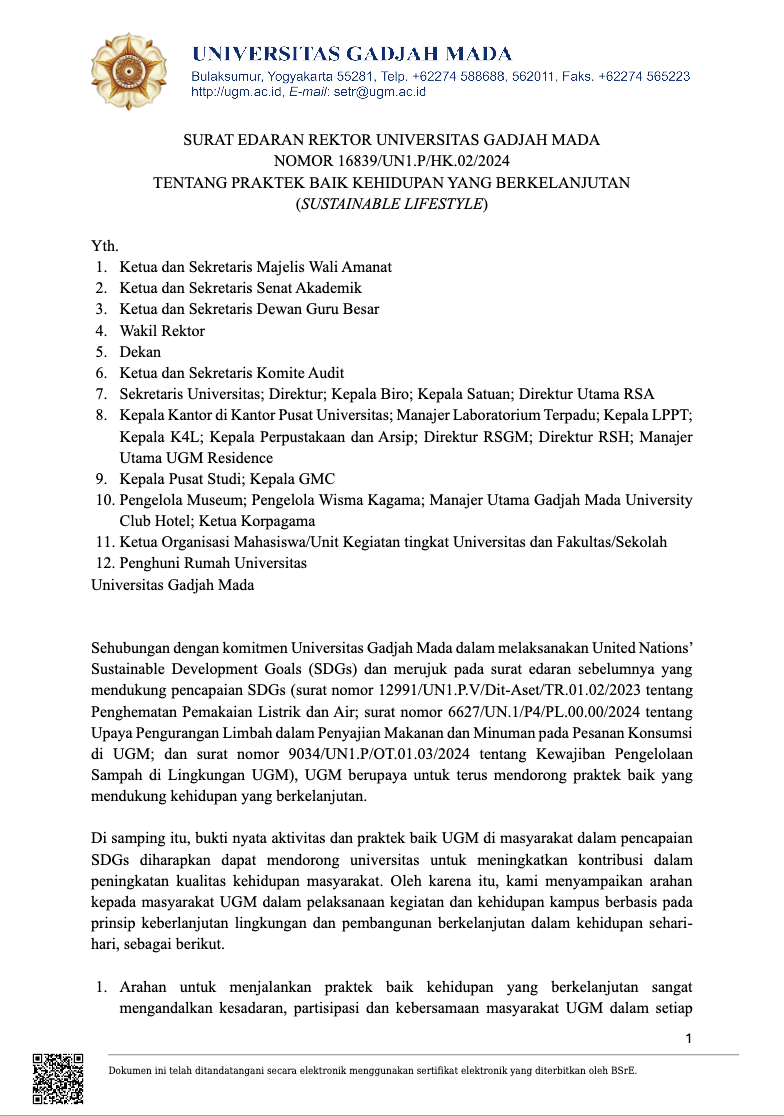
Circular Letter Number 1797/UN1.P/KJM_BU/2020 on Sustainable Lifestyle served as a precursor regulation to the current regulation.
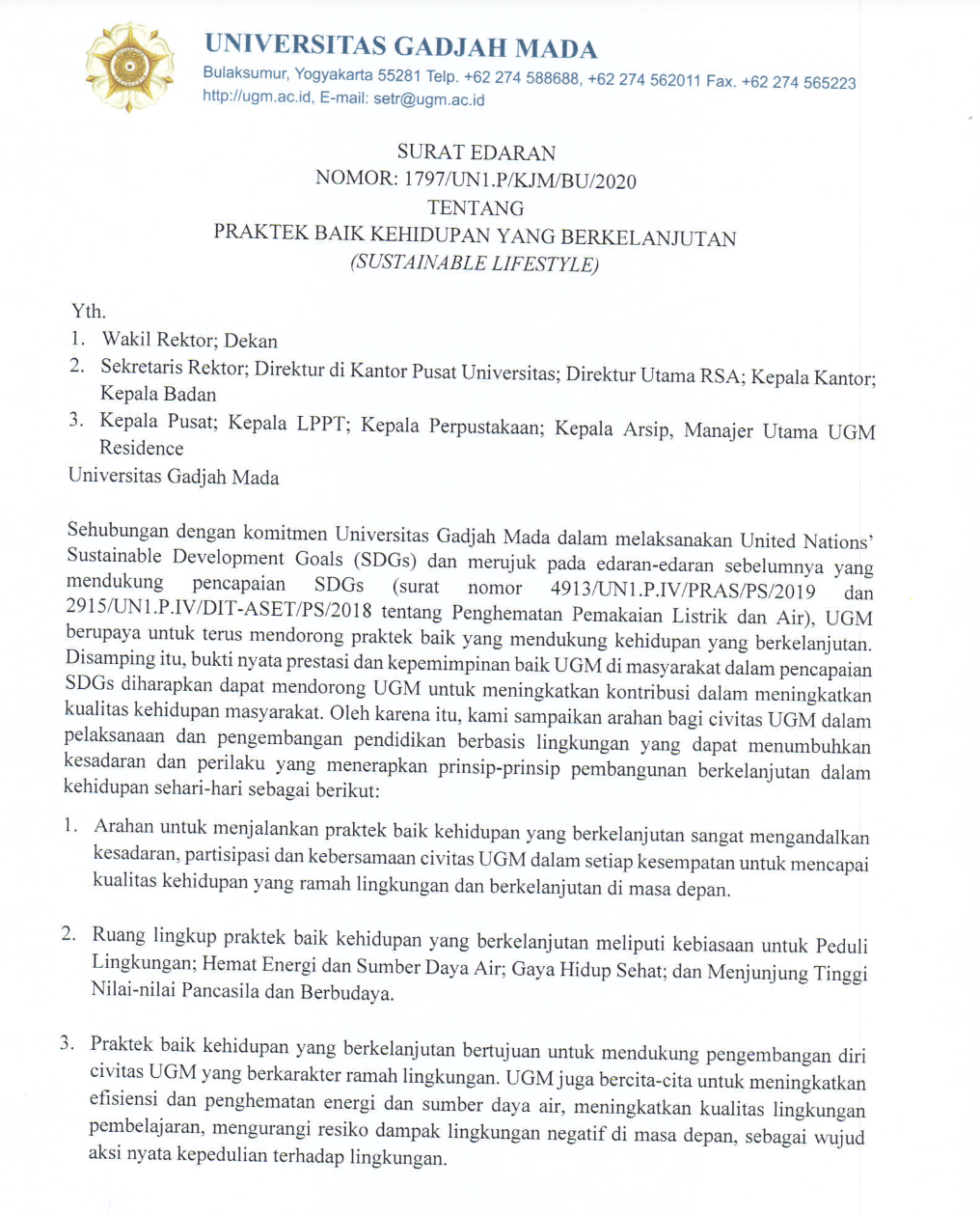
Policies on Campus Waste Management
Effective campus waste management is equally critical. Campuses produce large amounts of paper, plastic, electronic, and organic waste. Proper waste management in institutions of higher education such as UGM will minimize landfill waste, pollution, and greenhouse gas emissions. Not to mention, recycling and composting programs help reduce the ecological footprint of the university.
The latest regulation is Appeal No. 3206/UN1.P5/BMS/TR.01.03/2025 1 concerning Campus Waste Management in UGM’s Central Office The appeal details the placement of trash bins in the building and the process of sorting the waste into three categories. In addition, all work units in the Central Office must appoint a staff to manage waste in their respective work units, who are then tasked with disposing of waste from the work unit to a temporary waste storage area south of the KPU. Waste disposal time is carried out every working day at 15.00 to 15.30 WIB.
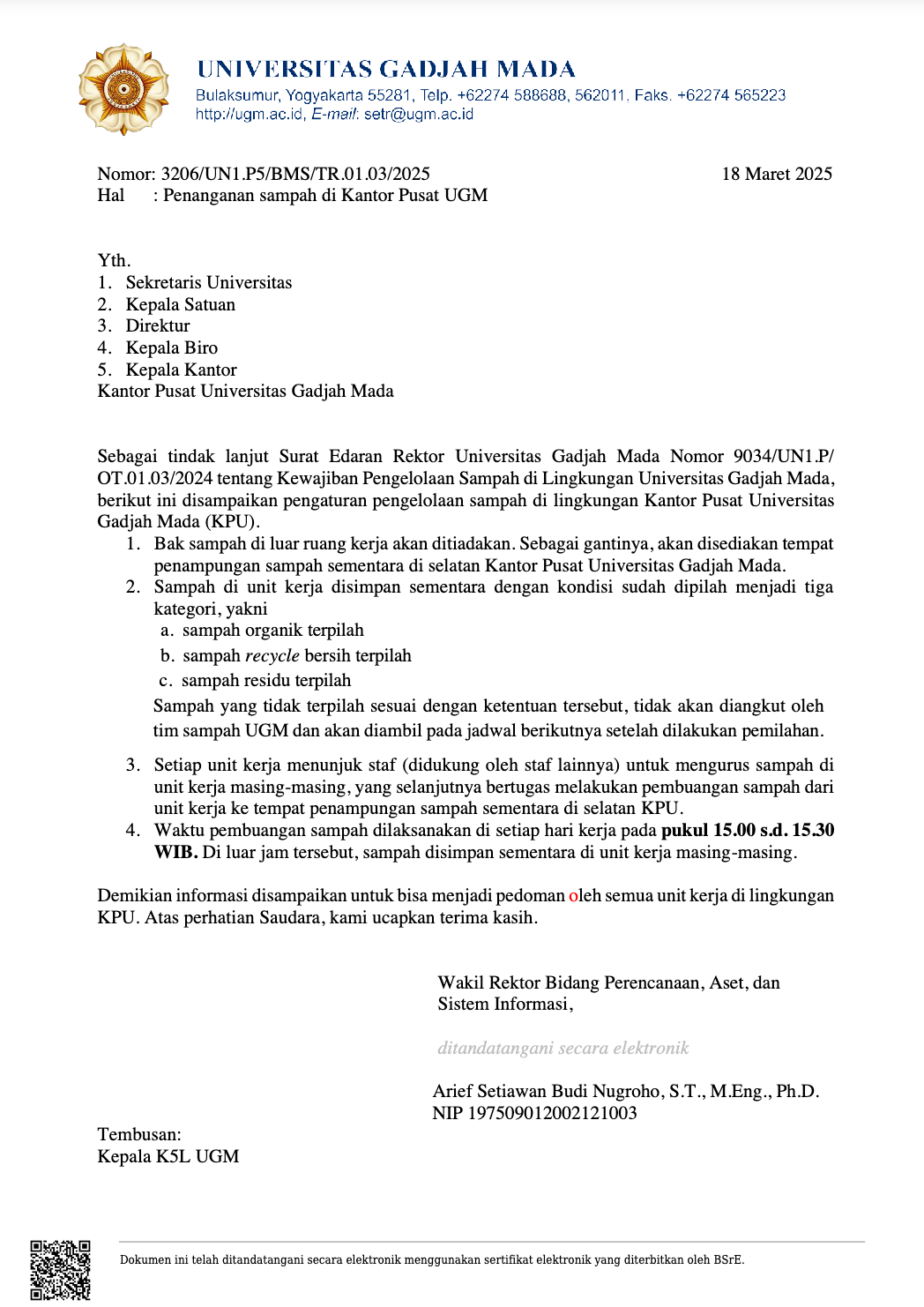
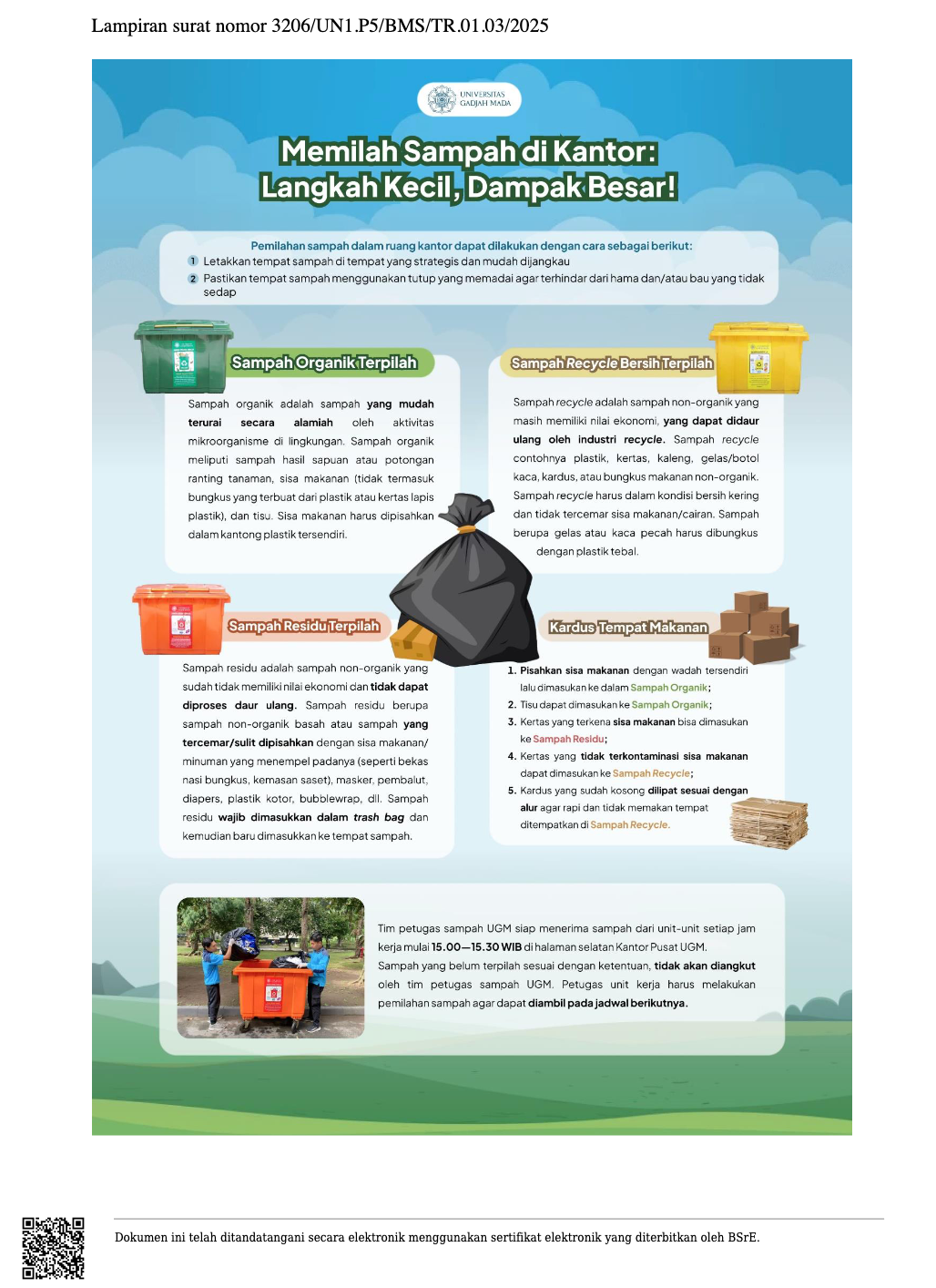
This appeal supports the Rector’s Circular Letter Number 9034/UN1.P/OT.01.03/2024. This regulation mandates all university units to comply with campus waste management policies, reinforcing the necessity of food waste tracking within UGM’s sustainability framework.
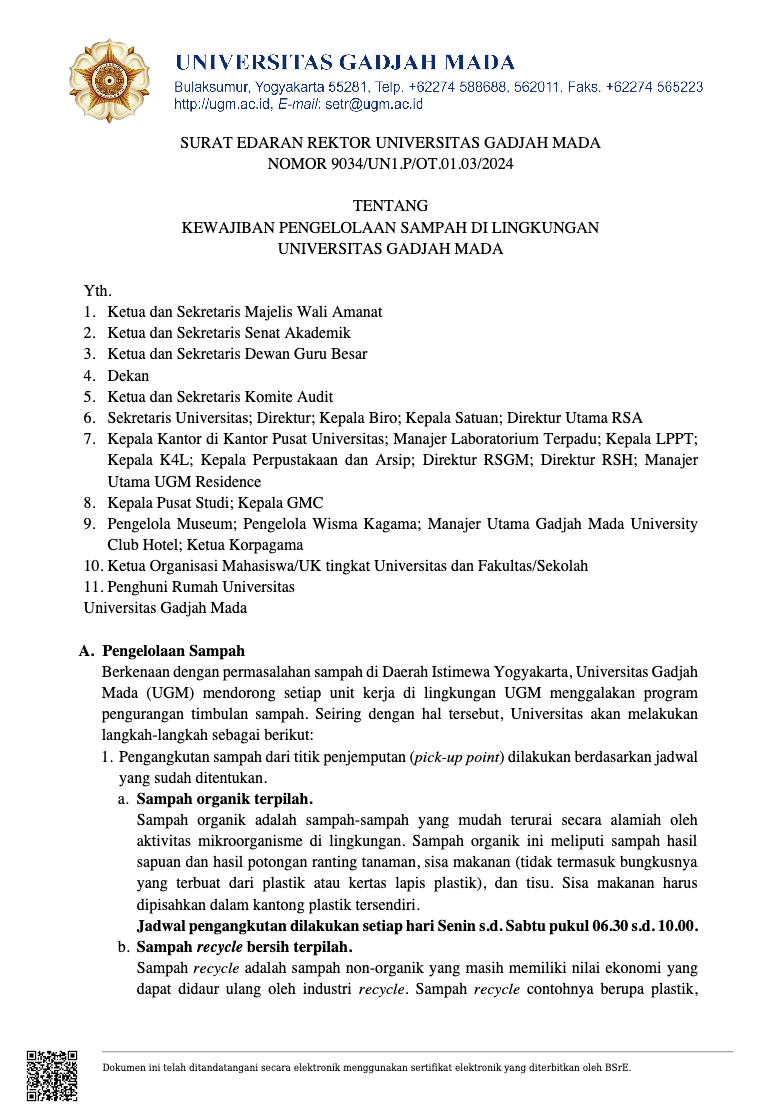
The Vice-Rector for Human Resources and Finance previously issued Circular Letter Number 6627/UN1.P4/PL.00.00/2024 on waste reduction. This regulation emphasizes efforts to reduce waste in food and beverage services and encourages the use of reusable or biodegradable materials and discourages single-use plastics in campus activities.
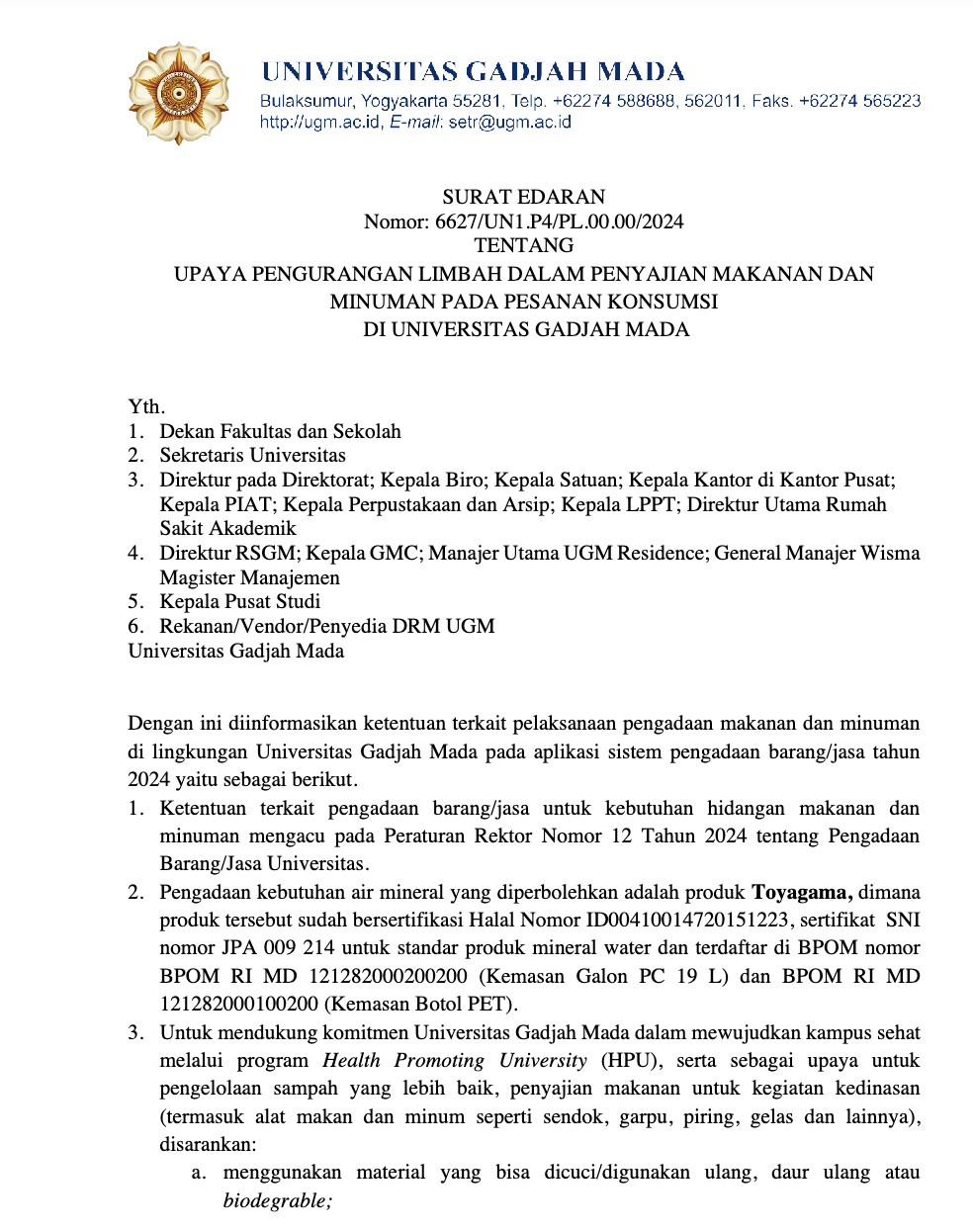
This policy is a follow up to one established in 2023, specifically Circular Letter Number 8846/UN1.P.V/Dit-Aset/TR.01.02/2023 on Waste Management, which details guidelines for organic waste management, including food waste, within the university. These guidelines include schedules for organic waste collection and regular monitoring and measurement of waste quantities. By tracking the origins and amounts of organic waste, including food leftovers, UGM can collect accurate measurements for identifying departments or units generating significant waste. On a daily basis, UGM operates according to the Standard Operating Procedure on waste disposal management.
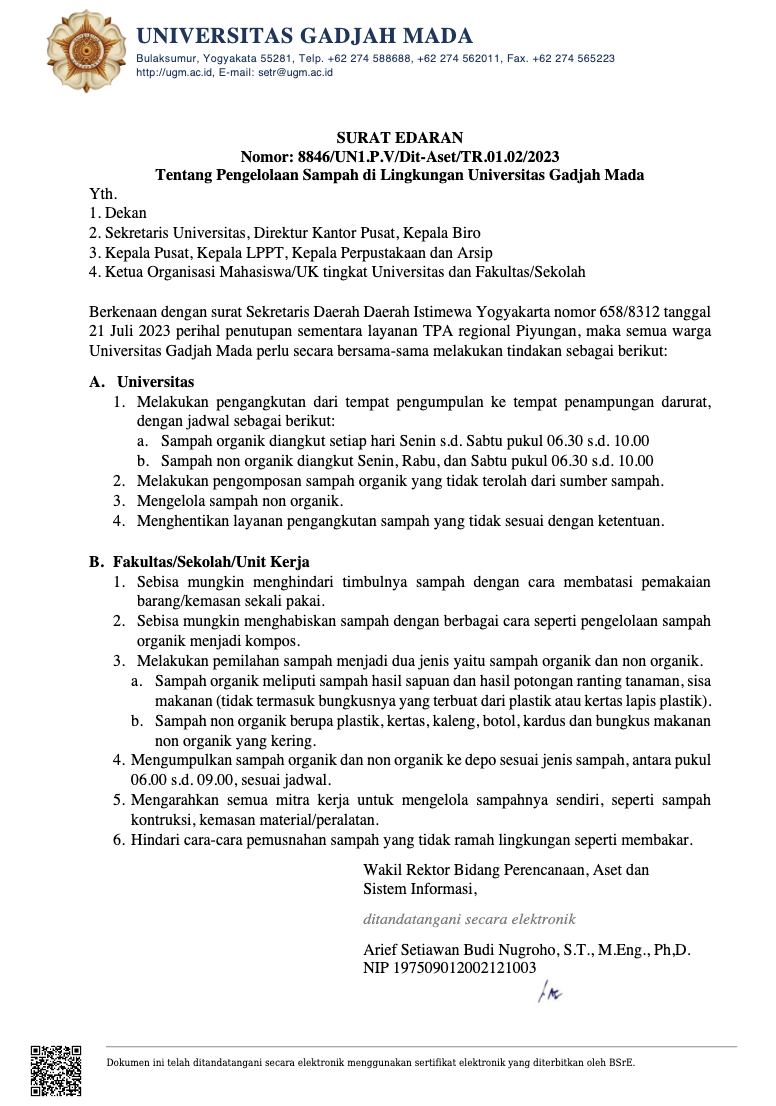
Food Waste Management is a critical part of climate action on campus. Good food waste management is able to mitigate Greenhouse Gas Emissions, since food waste contributes to methane emissions in landfills, which is a potent greenhouse gas. Secondly, food production consumes a significant amount of water, energy, and land. Minimizing food waste helps conserve these resources. Food waste management also encourages circular economy practices, as composting food waste supports soil health and reduces reliance on chemical fertilizers. The Department of Chemical and Environmental Engineering has even integrated food waste into biogas production in several community empowerment programs throughout Java island.
Policies on UGM Campus Transportation
Following the University’s Master Plan regarding Campus Transportation stated in Rector’s Decree Number 911 Year 2018, UGM is dedicated to lowering carbon dioxide emissions by applying three concepts (pg. 8) which are 1) Prioritizing pedestrians and cyclists, 2) One Gate Campus protocol which restricts the use of motorized vehicles on campus, and provides parking lots and campus buses, and 3) creating a Better Campus Network that involves the integration of UGM campus transportation with city transportation services.
Policies on Upgrading Campus Buildings to Higher Energy Efficiency
Strategic plans are in the works to upgrade existing buildings to higher energy efficiency. By integrating sustainable practices and fostering green behaviour, UGM aims to align its infrastructure with global standards, supporting its Strategic Plan 2022–2027 for a greener, more sustainable campus. This includes obtaining certifications in energy efficiency for its campus buildings.
The university appoints a designated Person-in-Charge (PIC) in each faculty to monitor the energy consumption of their faculty buildings and participate in training and socialisation sessions conducted by the Green Campus Team. As a result, new and existing buildings must be managed to ensure they achieve higher energy efficiency standards.
For the past few years, UGM has organised the UGM Sustainable Campus Awards to encourage faculties to implement environmentally friendly construction practices and promote green behaviour to address climate change. The Sustainable Campus Awards will recognize faculties with the most sustainable learning centres. The Faculty of Animal Science took part in the 2024 awards program. Their Animal Science Learning Center (ASLC) was one of the leading centers that year, achieving approximately 30% energy savings through the use of natural daylight.
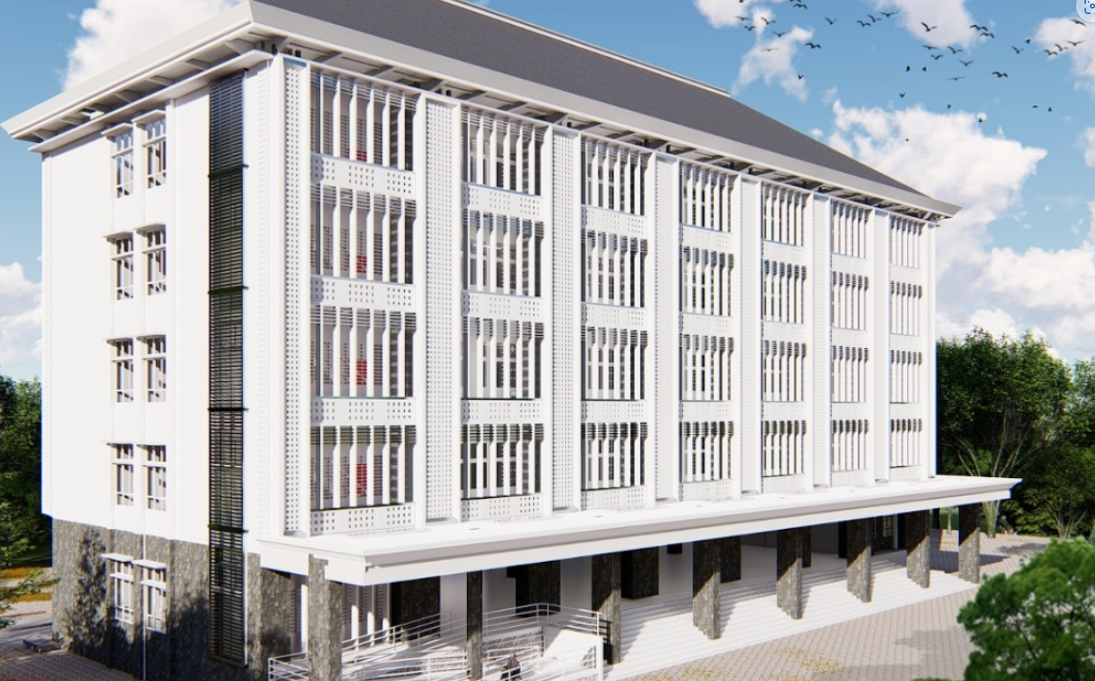
Source: Animal Science Learning Center (ASLC)
Additional policies are in place that oversee the renovation and construction of campus buildings which must adhere to energy efficiency standards, in accordance with Rector’s Regulation Number 157 Year 2020 and the Universitas Gadjah Mada’s Strategic Plan 2022-2027.
Policies on Saving Electricity Usage
Part of green behaviour is reducing electricity consumption. It is clearly stated in Rector’s Regulation Number 2 Year 2022 Management and Saving on Electricity Usage at UGM Article 15 that the electricity consumption in UGM must be reduced by 20% compared to the average usage over the six months preceding the enactment of this regulation. Saving electricity usage is carried out through: a. air conditioning system; b. lighting system; and c. supporting equipment (Article 16-18).
This regulation builds upon Regulation Number 157 Year 2020.
Article 16 of the regulation provides guidelines for implementing electricity savings by optimising air conditioning systems, lighting systems, and supporting equipment.
Article 17 demands green behaviour not only in the learning and teaching facilities, but also in the university office buildings. This includes turning off the air conditioning (AC) when the room is not in use and adjusting the room temperature in accordance with Indonesian National Standards (SNI), which range between 24°C and 27°C.
Regarding the Requirement for Electrical Systems (pg. 33), all faculties and university buildings must prioritize using energy-efficient appliances based on the Indonesian National Standard (SNI).
UGM also has a water and energy conservation guidebook which follows the international UI GreenMetric Guidelines. The technical guidelines serve as the performance indicator for the use of electricity and water in all buildings.
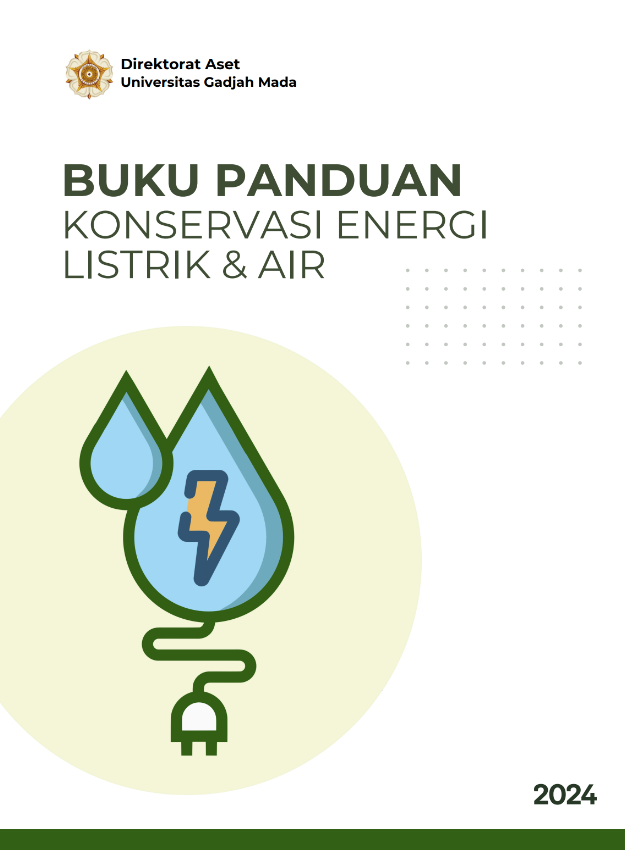
Water Management on Campus
The Rector Decree on Technical Guidelines for UGM Building Code is the basis of the Clean Water Management System on campus.
This system includes wastewater management on campus. Article 11 Verse 3 states that wastewater and foul water disposal systems must be carefully planned and installed based on the type and level of hazard. Wastewater management should comply with SNI and other relevant regulations, and treatment can be done either on-site or through an existing wastewater treatment plant.
Other articles of note are listed below:
Article 13 Verse 2 states the technical planning stage of campus green buildings require site management, energy use efficiency, water use efficiency, indoor air quality, use of environmentally friendly materials, waste management, and wastewater management.
Article 13 Verse 2 Section 3 concerning Water Use Efficiency addresses water source, water usage, and use of water-saving sanitary appliances (water fixtures).
Article 13 Verse 2 Section 7 concerning Wastewater Management addresses: a) providing facilities for the treatment of solid and liquid waste before disposal into the city sewer system and, b) recycling water from liquid waste (grey water).
Rector’s Decree Number 157/UN1.P/KPT/HUKOR/2020 adds to UGM’s water management by regulating the Rainwater Management System in Article 11.4. Every building and its surrounding area must have a rainwater management system to support environmental sustainability and water resource conservation. Rainwater should be absorbed into the ground or achieve zero outflow, using methods like infiltration gardens, soak wells, or retention ponds. These systems must be maintained to prevent sedimentation and blockages.
Climate Action Plan Shared with the Community
Tackling climate change requires collective effort and shared responsibility. As a leading institution, UGM recognizes that meaningful climate action cannot be achieved in isolation. That is why UGM collaborates with the government, industry, and communities across Indonesia in the hopes of driving impactful change. Together, UGM can accelerate climate solutions, promote environmental stewardship, and support Indonesia’s transition toward a sustainable and resilient future.
Developing a Waste Management Plan

Developing a Disaster Management Plan
Together with the Salatiga City Government, UGM developed a 2021-2026 Disaster Management Plan (RPB) to mitigate risks. This document outlines threat conditions, vulnerabilities, and strategies for risk reduction, informing policies across different phases and addressing priority disaster issues at various administrative levels.
Developing an Environmental Protection and Management Plan
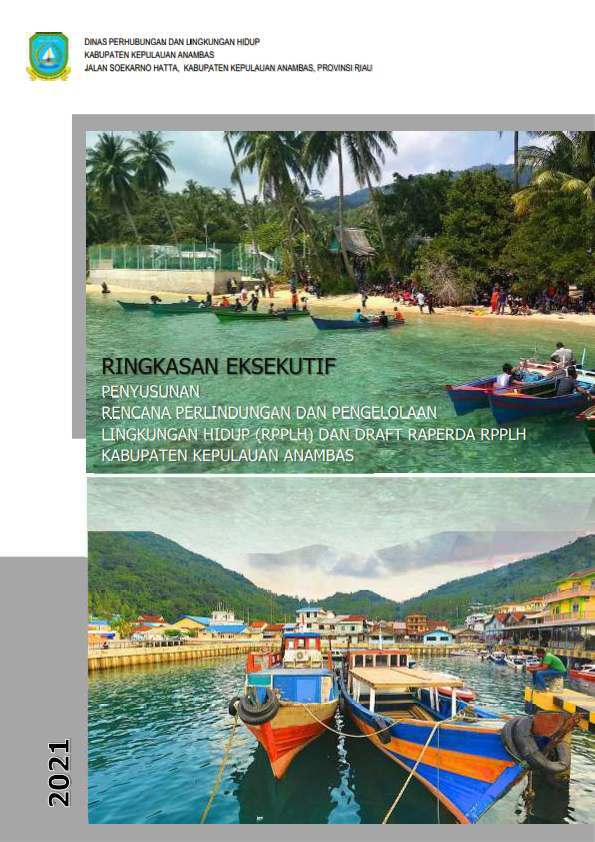
UGM also advises the Anambas Islands Regency Government in proactively addressing environmental impact by considering ecological diversity, population distribution, natural resources, local wisdom, community aspirations, and climate change in the formulation of the Anambas Islands Regency Environmental Protection and Management Plan (RPPLH).
UGM at the Forefront of the CDSR Consortium
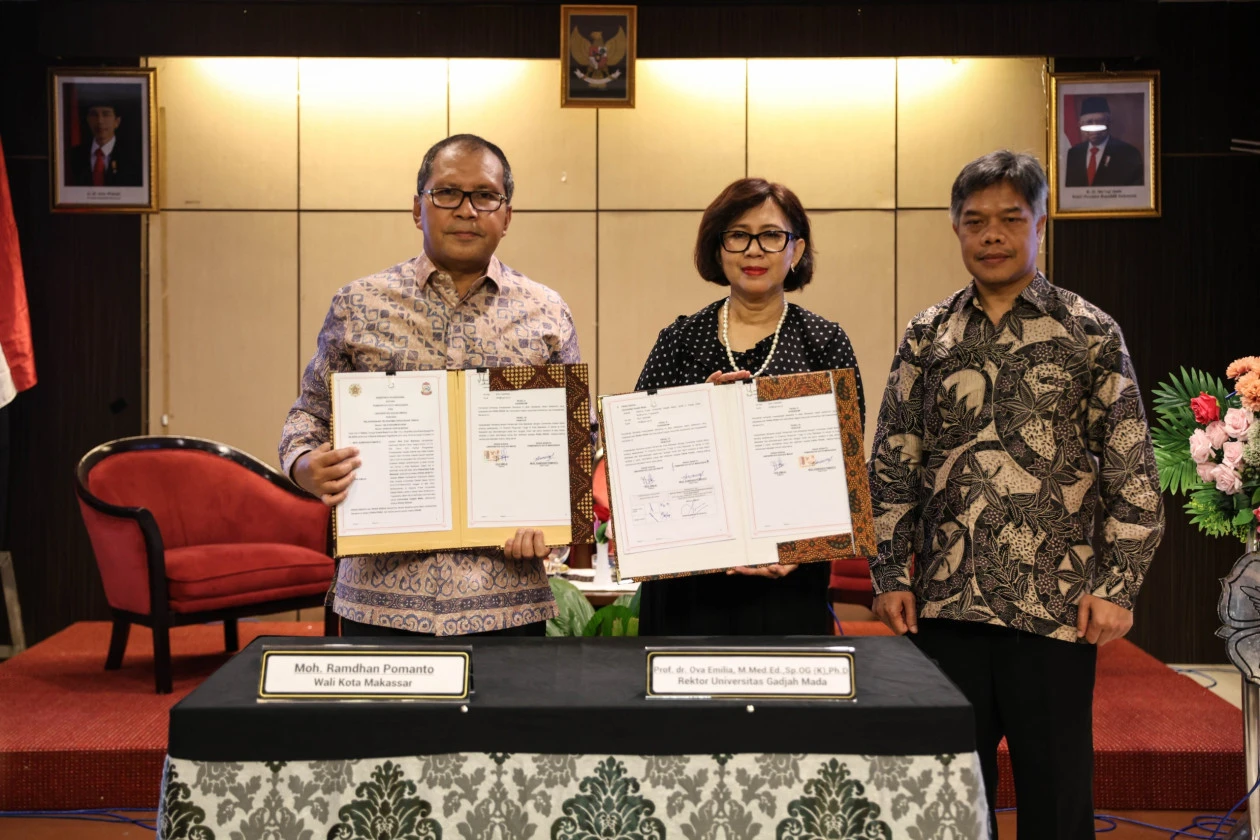
Source: https://ugm.ac.id/id/berita
UGM and the Government of Makassar City are two of many prolific institutions that have joined hands to establish the Centre for Development of Sustainable Region (CDSR) consortium. Together with reputable researchers from universities across Indonesia and abroad, including the University of Colorado Boulder, Penn State, Virginia Tech, and Institut Teknologi Bandung, the consortium is implementing a renewable energy utilisation program in Makassar City which aims to enhance community welfare and reduce carbon footprint emissions.
The collaboration between UGM, the Government of Makassar City, and the CDSR consortium aligns with Indonesia’s broader commitment to renewable energy development as outlined in Indonesia’s National Energy Plan (RUEN). While initiatives like the renewable energy program in Makassar demonstrate localised efforts to enhance community welfare and reduce carbon emissions, these align with national ambitions to achieve 23% renewable energy use by 2025.
UGM Lends Experts to Refine the Renewable Energy and New Energy Bill
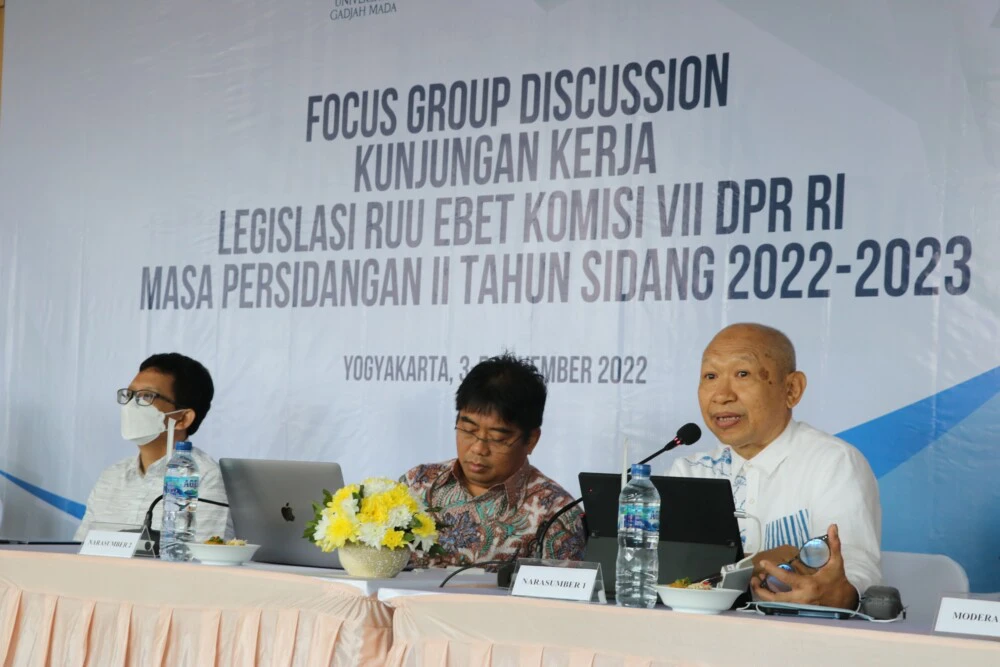
Source: input for the EBET Bill
The draft Renewable Energy and New Energy Bill (RUU EBET), currently under review by the Indonesian House of Representatives (DPR RI), seeks to build on renewable energy initiatives by addressing fossil fuel dependency and accelerating clean energy adoption. To refine this policy framework, energy experts, including UGM’s Prof. Tumiran, have contributed visionary strategies integrating renewable energy with economic growth and industrial expansion to the policy draft. The Indonesian House of Representatives has also sought input for the EBET Bill from UGM’s Faculty of Engineering.
UGM Hosts Workshop on Energy Research
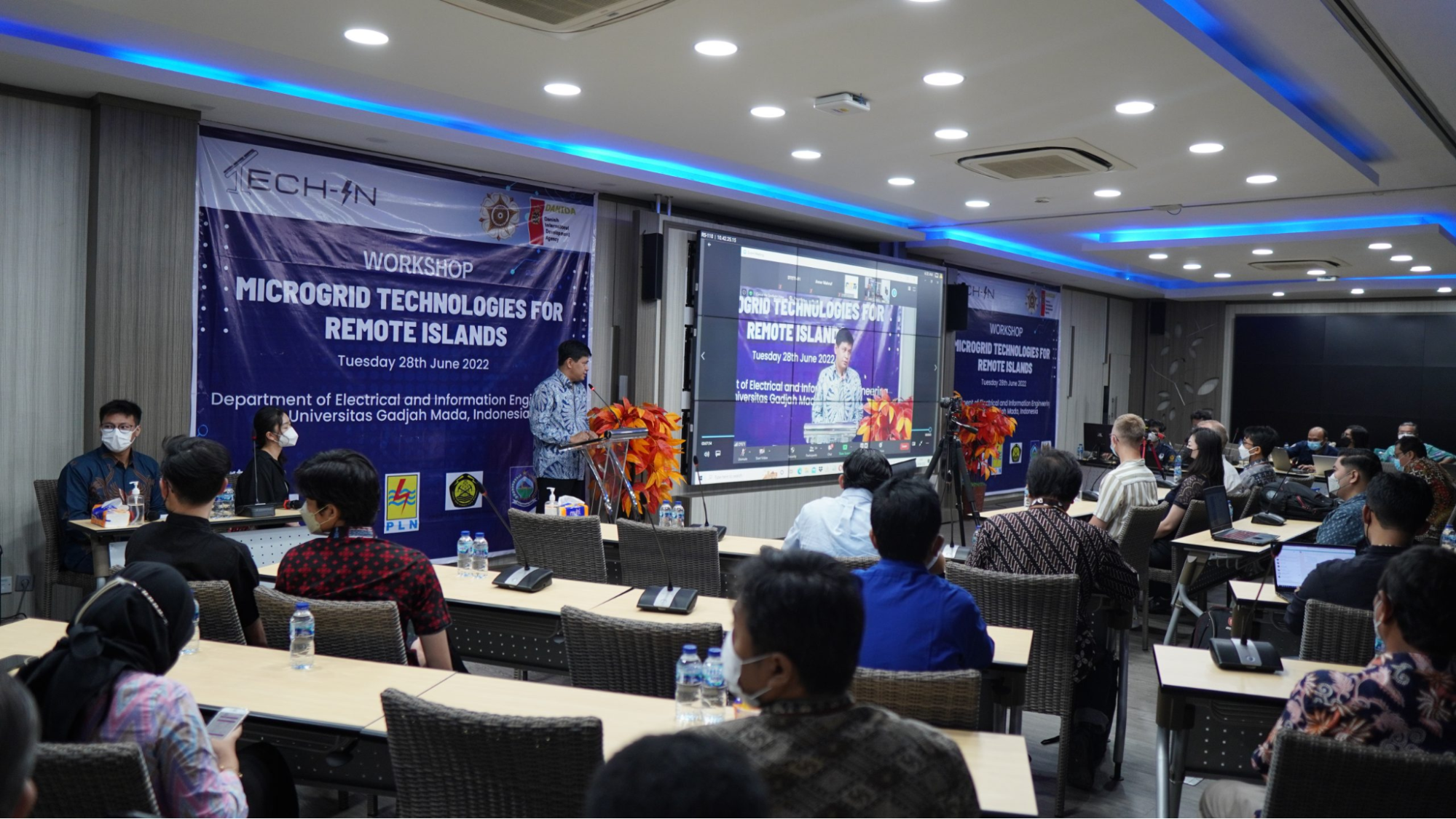
Source: Microgrid Technologies for Remote Indonesian Islands (Tech-IN)
The refinement of the Renewable Energy and New Energy Bill (RUU EBET) has spurred collaborations that extend beyond legislative discussions, highlighting the need for integrated approaches to clean energy solutions. Complementing this effort, UGM hosted the Microgrid Technologies for Remote Indonesian Islands (Tech-IN) Workshop, a forum for policymakers from the government, researchers from national and international energy research institutions, academics from universities, as well as managers and engineers from industry to share ideas and research results related to the application of system technology microgrids in remote locations in Indonesia. This forum represents a collaborative effort in energy policy research, bringing together both private and public institutions alongside a robust national and international network.
Key participants include the Center for Research on Microgrids (CROM), the Ministry of Energy and Mineral Resources of the Republic of Indonesia, the National Energy Council, PT PLN (Persero), the Government of West Nusa Tenggara, Aalborg University in Denmark, the Center for Energy Informatics at the University of Southern Denmark (SDU), and the Danish International Development Agency (DANIDA).
UGM and Banggai Regency Agree to Cooperate on Water Resources and Geopark Management
The Banggai Regency Government and Universitas Gadjah Mada have agreed to a cooperation agreement in education, research, and community service. The agreement is related to urban water resources and geopark management; he said Banggai Regency needs this cooperation because it has enormous potential. This is important to overcome the problem of people who often lack water.
Ministry of Environment and Forestry (MoEF) Intensifies Cooperation with Faculty of Geography UGM, Minister of MoEF Water Resources and Land Resources Policy Equally Important
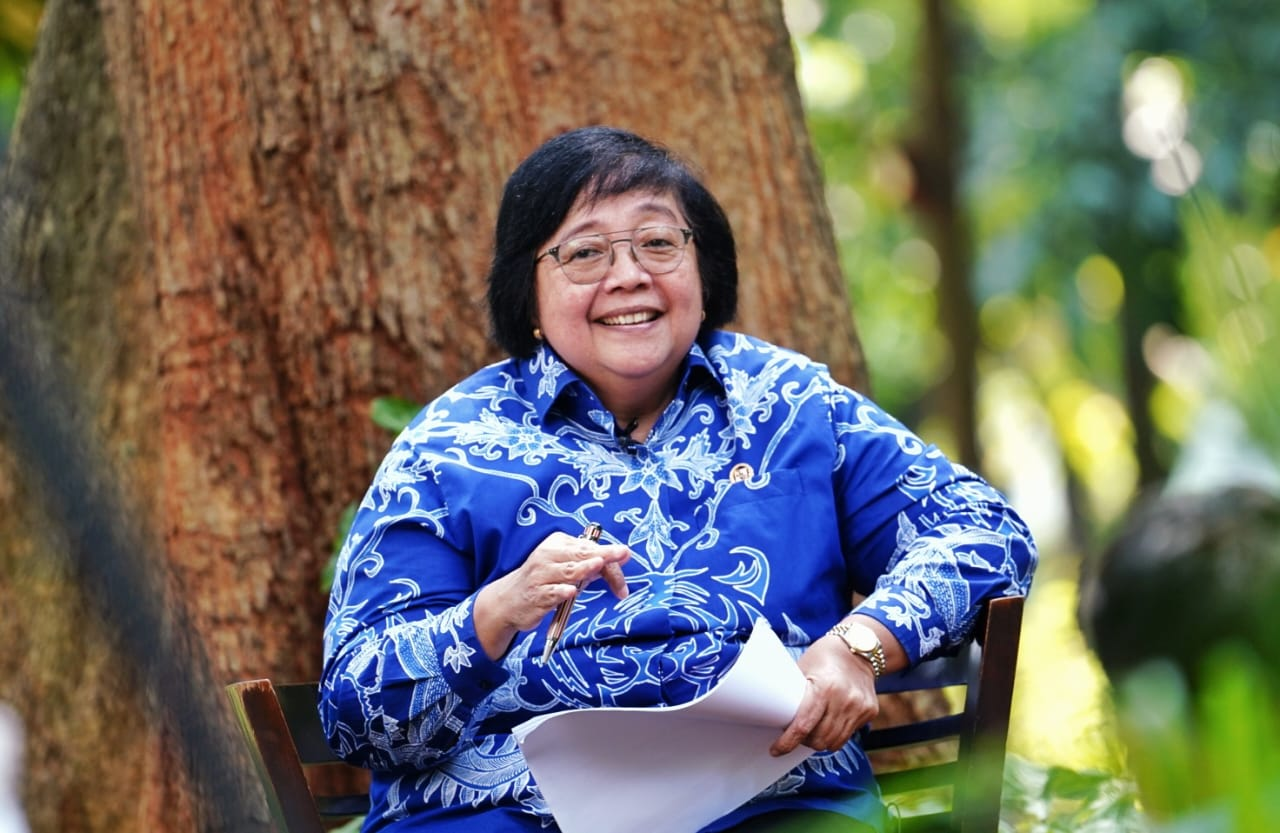

Source: Collaboration with the Ministry of Environment and Forestry
The Faculty of Geography intensifies collaboration with the Ministry of Environment and Forestry to develop strong policy tools in land resource management, the latest being the FOLU Net Sink 2030. Water resources policy needs to be strengthened by the UN-Water Summit on Groundwater 2022 held on 7-11 December, 2022, in Paris, which affirmed the need to implement integrated water resources management for more responsible and sustainable use and protection of groundwater, springs and surface water.
UGM and NUS are Collaborating on Research to Support Ibu Kota Nusantara (IKN) as a Modern and Sustainable City

Source: UGM and NUS are collaborating on research for modern and sustainable cities
Universitas Gadjah Mada (UGM) and the National University of Singapore (NUS) have agreed to collaborate in supporting the development of Indonesia’s new capital, Ibu Kota Nusantara (IKN), as a modern and sustainable city. This collaboration aims to combine the perspectives of both universities to promote sustainable development of IKN and facilitate the exchange of knowledge and experience between university experts and government officials. The partnership involves at least five experts from NUS working together with the Faculty of Geography at UGM to find solutions related to regional and global climate change.
UGM is Committed to Manage Wanagama Nusantara as an Interdisciplinary Educational and Research Forest

Source: the inauguration of Wanagama Nusantara Forest
President Joko Widodo inaugurated the Wanagama Nusantara Educational and Research Forest in Indonesia’s new capital, Ibu Kota Nusantara (IKN), East Kalimantan. The 621-hectare forest, managed by Universitas Gadjah Mada (UGM), is intended to serve as a center for interdisciplinary education and research, support the restoration of tropical rainforests, and contribute to climate change mitigation and biodiversity conservation. UGM also plans to establish the Institute for Future Life in the area, featuring smart and environmentally friendly buildings as part of its commitment to environmental sustainability.
UGM Hands Over a Policy Brief to The Government Regarding the Relocation of The National Capital

Source: UGM hands over a policy brief to the government regarding the relocation of the national capital
In the process of relocating the national capital, the government must consider the principles of social and spatial justice. In relation to this, several professors from the Faculty of Geography at Universitas Gadjah Mada (UGM) have conducted a series of seminars and academic studies on the subject. The outcome of these activities is a policy brief that outlines several key recommendations regarding the parameters for selecting the new capital’s location, including physical aspects, demographic factors, migration patterns, accessibility, and inclusivity.
Sources:
- Board of Trustees Regulation Number 1 Year 2021
- Circular Letter Regarding the Implementation of SDGs at UGM
- Circular Letter Number 16839/UN1.P/HK.02/2024
- Circular Letter Number 1797/UN1.P/KJM_BU/2020
- Circular Letter Number 9034/UN1.P/OT.01.03/2024
- Circular Letter Number 6627/UN1.P4/PL.00.00/2024
- Circular Letter Number 8846/UN1.P.V/Dit-Aset/TR.01.02/2023
- Standard Operating Procedure on waste disposal management
- Rector’s Decree Number 911 Year 2018
- Animal Science Learning Center (ASLC)
- Strategic Plan 2022-2027
- Rector’s Regulation Number 157 Year 2020
- Rector’s Regulation Number 2 Year 2022
- Water and energy conservation guidebook
- Rector Decree on Technical Guidelines for UGM Building Code
- Rector’s Decree Number 157/UN1.P/KPT/HUKOR/2020
- https://ugm.ac.id/id/berita
- Policy draft
- Microgrid Technologies for Remote Indonesian Islands (Tech-IN)
- 2021-2026 Disaster Management Plan (RPB)
- Anambas Islands Regency Environmental Protection and Management Plan (RPPLH)
- water resources and geopark management
- Strong policy tools in land resource management
- Food waste transformation to Biogas
- UGM and NUS are collaborating on research for modern and sustainable cities
- The inauguration of Wanagama Nusantara Forest
- UGM hands over a policy brief to the government
